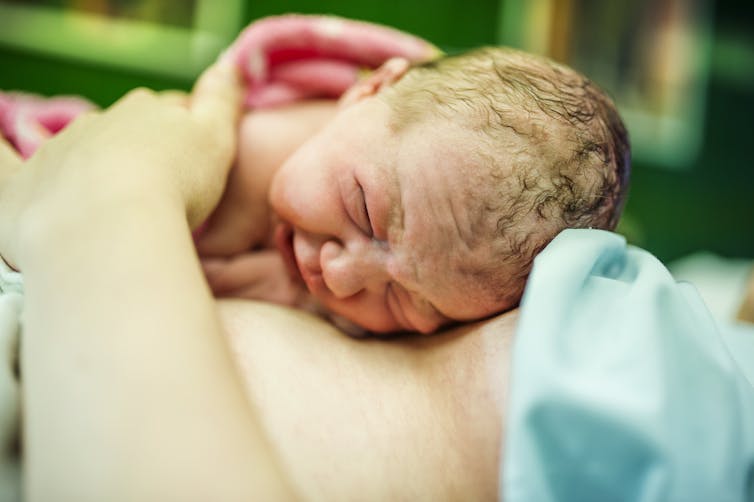
Hannah Dahlen, Western Sydney University and David Ellwood, Griffith University
Having a baby is stressful enough without a coronavirus (COVID-19) pandemic and all the associated misinformation.
If you’re pregnant and/or due to give birth soon, it’s best to get information from trusted sources such as the World Health Organisation, the Royal College of Obstetricians and the Australian Government Department of Health.
Here are the key take-home messages.
It’s a new virus
As COVID-19 is a new virus, we are learning more about it every day. As most pregnant women are young and generally healthy, they’re less likely to be severely affected (which is good news). But as there is also a baby to consider, the picture can be more complex.
A baby born recently to a mother in the UK with COVID-19 recently tested positive soon after birth but we are not sure whether it was infected in the womb (unlikely) or after birth (more likely).
As far as we know, the baby is fine and the mother is being treated. Other reports on babies with COVID-19 have also shown they had mild symptoms and a good recovery.
Read more:
Coronavirus with a baby: what you need to know to prepare and respond
From China’s experience to WHO advice
To date, much of our information on COVID-19 has come from China. This is where one of the first studies, involving just nine pregnant women with COVID-19, came from.
All these women had caesarean sections, none were seriously unwell and all mothers and babies recovered. The study found none of the babies appeared to get COVID-19 and there was no evidence of the virus in the baby, breastmilk or fluid surrounding the baby. It’s not clear why these babies were born by caesarean section. China has a very high caesarean section rate, which is not optimal, and this may have influenced how they responded.
The World Health Organisation’s new guidelines state:
there is no evidence that pregnant women present with different signs or symptoms or are at higher risk of severe illness. So far, there is no evidence on mother-to-child transmission when infection manifests in the third trimester … WHO recommends that caesarean section should ideally be undertaken only when medically justified
Why pregnant women are not more susceptible to COVID-19
Pregnant women are generally more susceptible to viruses that cause breathing problems (like the flu). Their immunity is lowered, their lungs are more compressed and they need more oxygen.
However, this doesn’t seem to be the case with COVID-19. In an analysis of 147 women with COVID-19, only 8% had severe disease and 1% were in critical condition. That’s lower than the general population.
The lowered immune response of pregnancy, which is needed to stop a woman’s body responding to her baby as a health threat, may actually provide extra protection with COVID-19. COVID-19 seems to be more severe in people with an immune system working hard dealing with other health disorders.
With COVID-19, more men than women are affected and women are less likely to get severely ill and die. To date, the death rate is 1.7% for women and 2.8% for men.
However, as the pandemic spreads this may change. Women comprise the majority of the health workforce and caregivers will be in contact with more sick people.

Shutterstock
How can pregnant women protect themselves and others?
Pregnant women should do the same things as the general public to protect themselves, including:
- covering the mouth when coughing (by coughing into the crook of your elbow)
- avoiding people who are sick
- asking people who are unwell to avoid visiting
- washing hands often with soap and water or an alcohol-based sanitizer and
- avoiding large gatherings.
It would be sensible not to travel overseas at the moment; you may have to self-isolate when you return.
Women who think they may have contracted COVID-19 can now consult their GP or other health professional with a bulk billed telehealth call (video call) rather than having to go in person.
Women who are pregnant or have new babies are given priority for telehealth services.
If you have been asked to self-isolate due to contact with someone with COVID-19, or have the illness, make sure you contact your midwife or obstetrician by phone and follow the advice of your health care provider.
What about going to hospital for antenatal visits and birth?
Keep going to appointments but don’t stress if you miss a couple, and early discharge might be a good idea if you’re able.
If you are booked into a birth centre or hospital, lots of precautions are in place to minimise the risk of infection. Birth will proceed as planned in the vast majority of cases and going home early would be ideal and may be encouraged if you and your baby are well.
Be aware some hospitals are restricting visitors and even support people, other than the partner, to try and reduce risk to the community.
Can the baby be infected with COVID-19 in the uterus?
The placenta is a very efficient filtering system and does an amazing job protecting babies from harm. The Zika virus was an exception to this.
There is no evidence of increased complications, though if a woman was very unwell (with high temperature or pneumonia, for instance) then the baby may be born prematurely.
This may be due to deliberate intervention by health professionals if the woman is very sick.
In general, though, a COVID-19 diagnosis should not lead to a decision for an early birth, unless ending the pregnancy is thought to be beneficial to the mother due to her overall condition.
There is not enough evidence that COVID-19 increases miscarriage and it is too early to know other longer-term impacts on the baby.
What should I do after the birth?
The benefits of breastfeeding are so significant the WHO recommends this should begin within an hour of birth. Skin-to-skin contact should be supported immediately following birth if the baby is well.

Shutterstock
If the mother is too ill, she should be assisted to express her milk. Breastfeeding is particularly effective against infectious diseases because it transfers antibodies and other important immune factors to the baby. If the woman or the baby have an infection, the composition of breastmilk even changes to increase important components that help the baby fight infection. So, if you were thinking of giving up breastfeeding, perhaps continue until this pandemic ends.
WHO recommends women who have COVID-19 should wash their hands before and after contact with the baby, use a medical mask when near the baby if they have symptoms (such as coughing), and routinely clean and disinfect surfaces they may have touched.
What else can you do?
When the seasonal flu vaccine becomes available, get vaccinated. We know this can be protective during pregnancy. It is free for pregnant women and there are no risks to your baby from flu vaccine. You will not be protected from COVID-19 but you will get some protection from the flu (which can be very problematic for pregnant women). The last thing you want is to have the flu and COVID-19 at the same time.
Free flu vaccinations will be available from GPs mid-April but if women want them earlier, they can get them for a fee at the pharmacy from end of March.
Most of all, try and stay calm and talk to your midwife or doctor if you are getting very worried.
Read more:
Coronavirus: 5 ways to manage your news consumption in times of crisis
![]()
Hannah Dahlen, Professor of Midwifery and Higher Degree Director, Western Sydney University and David Ellwood, Professor of Obstetrics & Gynaecology, Griffith University
This article is republished from The Conversation under a Creative Commons license. Read the original article.

You must be logged in to post a comment.